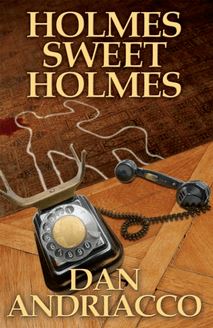Holmes Sweet Holmes , livre ebook
125
pages
English
Ebooks
2018
Vous pourrez modifier la taille du texte de cet ouvrage
Obtenez un accès à la bibliothèque pour le consulter en ligne En savoir plus
Découvre YouScribe et accède à tout notre catalogue !
Découvre YouScribe et accède à tout notre catalogue !
125
pages
English
Ebooks
2018
Vous pourrez modifier la taille du texte de cet ouvrage
Obtenez un accès à la bibliothèque pour le consulter en ligne En savoir plus
Publié par
Date de parution
04 septembre 2018
Nombre de lectures
0
EAN13
9781780921419
Langue
English
Title Page
HOLMES SWEET HOLMES
A Sebastian McCabe - Jeff Cody Mystery
by
Dan Andriacco
Publisher Information
First edition published in 2012 by MX Publishing
335 Princess Park Manor, Royal Drive,
London, N11 3GX
www.mxpublishing.com
Digital edition converted and distributed in 2012 by
Andrews UK Limited
www.andrewsuk.com
Cover design by www.staunch.com
© Copyright 2012 Dan Andriacco
The right of Dan Andriacco to be identified as the author of this work has been asserted by him in accordance with the Copyright, Designs and Patents Act 1998.
All rights reserved. No reproduction, copy or transmission of this publication may be made without express prior written permission. No paragraph of this publication may be reproduced, copied or transmitted except with express prior written permission or in accordance with the provisions of the Copyright Act 1956 (as amended). Any person who commits any unauthorised act in relation to this publication may be liable to criminal prosecution and civil claims for damage.
All characters appearing in this work are fictitious. Any resemblance to real persons, living or dead, is purely coincidental. The opinions expressed herein are those of the authors and not of MX Publishing.
Dedication
This book is lovingly dedicated to
ANN BRAUER ANDRIACCO
because for me she is the woman
Evening of Deception
“Wherever MacGregor sits is the head of the table,” according to a Scottish proverb.
Forget MacGregor, whoever he may be. When the Mac I know best held forth at the Faculty Club the night murder came to our campus, it was on him that all eyes focused. Less than six feet tall but significantly overweight and bearded, Sebastian McCabe, Ph.D., cuts an imposing (if unhealthy) figure.
He also has an imposing title, for he is the Lorenzo Smythe Professor of English Literature and head of the popular culture program at St. Benignus College.
Intensely interested in everything and everyone, Mac charges through life like a fullback - not always to the joy of other players in the field. He particularly fancies mysteries, magic, practical jokes, hoaxes, languages, reading, talking, eating, writing, drama, arguing, and smoking cigars. And he is more or less proficient at all those things.
Sometimes he drives me nuts, even though he is my best friend and my only sister’s husband. But he does capture one’s attention. Even Peter Gerard, the guest of honor at this private dinner party and a face you would pick out of any crowd, waited expectantly when Mac loudly cleared his throat after the last plate had been carried away.
Sebastian McCabe looked at his guests around the table, mostly academics, and favored us with a boyish smile as looked longingly at a big green cigar that he was forbidden from lighting.
“This is an interesting group we have here tonight,” he said; “diverse, but with more in common than you might imagine. Several of us, for example, pursue careers largely or solely based on the practice of illusion, deception.”
Was he including yours truly, Thomas Jefferson Cody, in that statement? It wouldn’t have surprised me. As the public relations director for St. Benignus, I’ve been called “flack,” “spinmeister,” and far less flattering epithets by those don’t understand my job - which, by the way, also includes government relations, marketing, the website, and social media as well as dealing with the public and the press.
I didn’t react, but Ralph Pendergast, St. Benignus’s provost and vice president for academic affairs, snorted and scrunched his face into what he thought was a smile. “A typically provocative statement, Professor McCabe,” said Ralph. “But surely you couldn’t be speaking of serious scholars like Father Pirelli, Professor Hoffer, and me?”
“Why not?” Mac said. “Good academicians are always first-rate illusionists.” While Ralph was still trying to figure out whether he’d been insulted, Mac went on: “But no, I did not mean you or Joseph.” He smiled at the Reverend Joseph Pirelli, C.T.L. - the legendary and beloved “Father Joe.” Our silver-haired president’s piercing blue eyes twinkled in response. “The illusions I had in mind are the sort practiced by the mystery writer, the magician, the filmmaker, and the flimflam artist.”
So he wasn’t including my profession among the deceptive arts. In fact, I didn’t fit into this conversation at all. The others around the table barely seemed to know that I was there, even though I stand six-foot-one and have red hair. I had no idea then why Mac had invited me. That I only learned later.
“These four professions all employ remarkably similar techniques of deception, but to greatly different effect,” Mac went on. Knowing my brother-in-law, I settled in for a lecture.
“You all know that I am a mystery writer as well as a professor and head of an academic program,” he began. “I am also a magician, and was once a professional at that as well. The magician creates an illusion and does not explain. He or she does, however, approach the whole business with a wink of the eye that lets us know that he knows we know it’s all a sham. That is part of the fun because we know we are being fooled but we do not know how. The filmmaker and Professor Hoffer’s charlatans, on the other hand, in their different ways attempt to maintain the illusion from beginning to end.”
He nodded toward Dr. Karl Hoffer. The assistant professor of psychology, new to St. Benignus, had a minor reputation for unmasking psychic frauds and religious hucksters. His book, The Great Miracle Scam, published just after he signed a contract to join our faculty, was getting a lot of media hype and seemed destined for best-sellerdom. I’d been a little surprised to find him on the guest list tonight because I knew that Mac considered the book - and its author - overrated.
“So you’re comparing me to gurus who levitate and preachers who raise people from the dead,” our guest for the evening said with a laugh. “Thanks a lot.”
Peter Gerard’s face is familiar to anyone who didn’t happen to be in Timbuktu that scorching hot summer of his biggest hit movie, 221B Bourbon Street. He peered at you from the magazines in the supermarket aisles all summer long, months before the murder. Dirty blond hair, curly, with a neatly trimmed goatee and mustache of a darker shade. My favorite magazine cover was the issue of Tick with Gerard’s mug under the headline Holmes Sweet Holmes? The celebrated actor-screenwriter-director had done the unthinkable. Not only had he played Sherlock Holmes wearing a goatee, but he had moved Holmes and his faithful Dr. Watson from Victorian London to 1920s New Orleans, Gerard’s hometown. Some Sherlockians were still howling.
So the looks of the man sitting next to Mac were no surprise. But at about Mac’s height, say five-ten, he was shorter than I’d expected from seeing Gerard on the screen. Actually, Gerard wasn’t the name he was born with, but I’ll call him that to keep it simple.
Karl Hoffer, who up to now had been mostly sucking on his unlit pipe and looking wise, rose to Gerard’s defense.
“I’m sure that Professor McCabe recognizes the difference between the benign illusion of the filmmaker and the deception of the mountebank.” He spoke softly and earnestly, just as if he were leaning across a studio-set desk to explain it to David Letterman or Jay Leno. With salt-and-pepper hair thinning out at the top above his high forehead, Hoffer was perfectly cast for a talk-show psychologist. He even wore a three-piece gray suit.
“It’s quite true,” Hoffer said, “that a filmmaker does attempt to create the illusion of reality - but only for the space of two hours or so, and only so that the viewer may be more perfectly entertained and perhaps instructed.”
“Sure,” Gerard agreed. “If you sit in the theater thinking, ‘This isn’t real’ because you spot the zipper on the monster suit, then the film isn’t working. It hasn’t made you accept the reality of the fiction long enough to become involved in what’s happening on the screen.”
Hoffer nodded. “The table tippers, the spoon benders, and their ilk that I expose want to involve you, too - but for a much darker purpose.” His professorial voice took on a sharper edge. “Usually they are in pursuit of money, or power, or both. In my new book -”
“Wait a minute,” Gerard said. “No matter what the purpose, every illusion depends to some extent on self-illusion, the conscious or unconscious willingness to be fooled.” He leaned across the table, deadly earnest. “That’s actually your field, isn’t it, Professor Hoffer - the psychology of self-deception?”
“Yes,” Hoffer said slowly. “It has been my special interest for some years.”
“I thought so,” Gerard said. “And I’m sure you’d agree that we all fool ourselves all the time.”
“Surely that is a bit of an overstatement!” Ralph Pendergast objected. Tonight he was wearing a blue suit without pinstripes instead of a blue suit with pinstripes. I figured he was trying to look laid back. “I certainly don’t accept the notion that my own life is built on a series of self-deceptions.”
“I am quite certain, Ralph, that your greatest delusion is that you have none,” Mac said. “Perhaps I can change your mind if you will only lend me a twenty-dollar bill.”
He hates to be called Ralph, by the way, which is why Mac and I do it. With his slicked back dark hair and those gray eyes shining through rimless glasses, the provost looked something like a hedgehog as he recoiled at the modest proposal. “What now, some sort of parlor t









